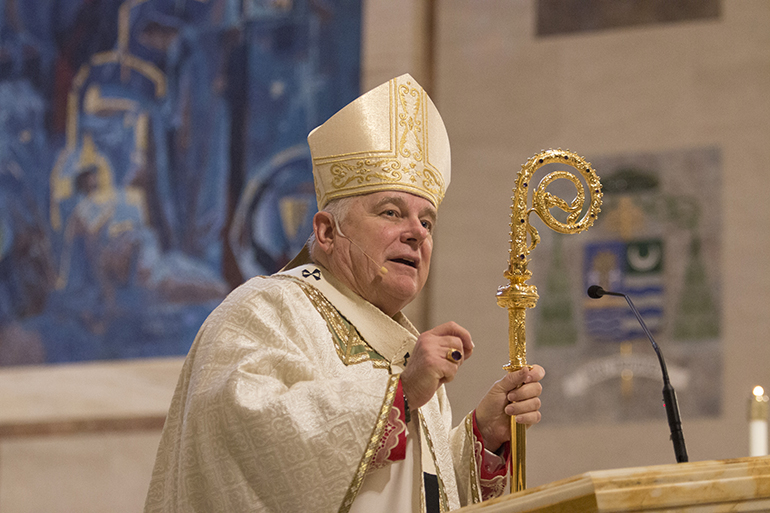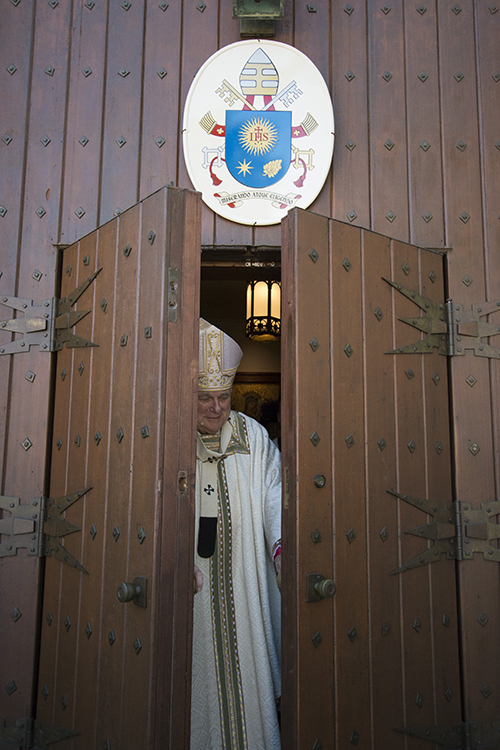By Archbishop Thomas Wenski - The Archdiocese of Miami

Photographer: ANA RODRIGUEZ-SOTO | FC
Archbishop Thomas Wenski preaches the homily during the Thanks-for-Giving Mass at St. Mary Cathedral Nov. 20.
Archbishop Thomas Wenski's homily at the 2016 Thanks-for-Giving Mass at St. Mary Cathedral. Sunday, Nov. 20, 2016.
In a few days, we will celebrate Thanksgiving. We, Catholics, do well to remember that Eucharist means ‘thanksgiving.’ The Mass is the perfect “Thanksgiving meal,” for united with Christ in his sacrificial gift of Himself, we give God thanks for the gift of our salvation, the gift of faith, the gift of knowing that we are loved by a merciful and compassionate God.
And so this Mass, as every Mass, is also about “thanksgiving” � and this Mass and the brunch that follows is also an opportunity for me, as your Archbishop, to thank you for your support over the years of the ABCD. So I guess you could say that this is a “thanks-for-giving” Mass.

Photographer: ANA RODRIGUEZ-SOTO | FC
Archbishop Thomas Wenski closes the Holy Door at St. Mary Cathedral after the Thanks-for-Giving Mass Nov. 20, feast of Christ the King and closing day of the Jubilee Year of Mercy.
Also today, the Holy Year of Mercy concludes with the closing of the Holy Doors that have welcomed over the past year hundreds, if not thousands, of pilgrims to St. Mary’s cathedral, the Mother Church of this archdiocese.
God is love � and we can only know God if we love. This is why Jesus commanded his disciples to love one another as he has loved us. Indeed, love is the new language that the Holy Spirit teaches the followers of Jesus to speak � a language spoken not only in words but in deeds. But if love is the language we are to speak as Christians, mercy is its grammar.
During this Year of Mercy, Pope Francis has reminded us of the words of Jesus: “be merciful as your Father in heaven is merciful”; and he has urged us to rediscover this grammar of mercy. To speak a language well, we need to master its grammar.
Love, to be truly love, cannot remain abstract � in must be translated into concrete gestures and actions. Those gestures and actions are described in the Catechism of the Catholic Church as the corporal and spiritual works of mercy: By performing these acts of mercy, our lives will communicate clearly and coherently the language of faith, the language of love.
Hopefully we all know these works of mercy by heart. The corporal works are: to feed the hungry; to give drink to the thirsty; to clothe the naked; to welcome the stranger; to visit the sick; to ransom the captive; to bury the dead. And the spiritual works of mercy are: to instruct the ignorant; to counsel the doubtful; to admonish sinners; to bear wrongs patiently; to forgive offenses willingly; to comfort the afflicted; to pray for the living and the dead.
And your generosity to the ABCD supports the various ministries of the archdiocese that are engaged in these various works of mercy above and beyond what happens in your local parishes or what you can do as individuals.
St. Ambrose, a 4th century bishop, said in speaking about the Gospel parable in which a rich man decided to build bigger barns to store his wealth and then died before he could enjoy it: "The bosoms of the poor, the houses of widows, the mouths of children are the barns which last forever."
True wealth consists not in what we keep but in what we give away. But love of money and wealth can easily crowd out love of God and love of neighbor. And so, in his preaching, Jesus makes clear that our hearts must either be possessed by God's love or our hearts will be possessed by the love of something else.
If we think prudently, then we have to acknowledge that what we have we do not own outright. In fact, the only things that we can claim to own are our sins; the rest belongs to God and we hold that in trust � and it's all going back to God eventually.
Today, the Church celebrates the solemnity of Christ the King At first glance, since today we are not governed by kings, we might be tempted to regard such a feast as an anachronistic relic of a long past era. Yet the solemnity of Christ the King � as a liturgical institution � is actually quite recent. It was established not by some medieval pope but by a quite modern day one, Pope Pius XI in 1925.
The Pope was not engaging in some flight of fantasy; in fact, adding the feast of Christ the King was rather a thumb in the eye of a world which had already begun to pretend that it could organize itself without God. Pope Pius had in mind the Bolsheviks in Russia and the fierce persecution of the Catholic Church in Mexico during the early 1920s.
While the establishment of the feast is recent, the content of what we celebrate today is indeed quite old � indeed it is as old as Christianity. To say that “Christ reigns” is the equivalent of what we say in our profession of faith: “Jesus is Lord.” This feast day reminds us � and given the hyper-partisanship of our recent elections and the ideological divisiveness that plagues our nation, we need to be reminded � our first allegiance as Christians, as Catholics, is to Christ our King.
And so when many thought that God should be exiled from the affairs of the world � or at least marginalized to the point where he didn’t really matter � Pope Pius XI in establishing this feast day reminds us all that Jesus is the world’s true ruler and judge.
Of course, this King is unlike the any other. His crown is a crown of thorns; his throne is a cross of wood.
Throughout his ministry Jesus shared forgiveness. He dies breathing it. He dies as he lived � reaching out to the distressed on either side of him. In the midst of his own agony he has time for others.
He tells the one thief, “Today, you will be with me in Paradise.” This thief is now known as the “good thief” � good because he stole paradise. What a perfect illustration of God’s mercy. Imagine, this thief made it to heaven even before St. Peter � he got there even before the Blessed Mother.
God’s love is gratuitous and superabundant. His love should inspire within us those values which create generosity, a generosity that transcends a human return, but one that calls us to give selflessly because of the gift we have been given.
As your Archbishop, I am grateful � deeply grateful � to each and every one of you for your stewardship.
On Thursday, you will gather with your loved ones for your “Thanksgiving meal.” But I thank you for sharing in today’s thanksgiving meal, the Holy Mass. This is our “thanks-for-giving” Mass which I am happy to offer for you, your loved ones and your personal intentions.
God bless.

